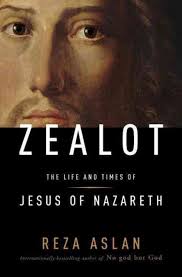 Just (yes, belatedly) picked up Reza Aslan’s bestselling book, Zealot: The Life and Times of Jesus of Nazareth. Not only is Reza a well-known and well-respected scholar, he’s also the brother-in-law of one of my good friends from seminary, and a connection through a couple other avenues as well.
Just (yes, belatedly) picked up Reza Aslan’s bestselling book, Zealot: The Life and Times of Jesus of Nazareth. Not only is Reza a well-known and well-respected scholar, he’s also the brother-in-law of one of my good friends from seminary, and a connection through a couple other avenues as well.
I thought about writing a response, but several others have done so already; instead, I’ll just point you to John Ortberg’s recent response at Menlo Park Presbyterian Church. You can watch/listen to the full message here.
A few snippets (emphasis mine):
Now the central claim of the book Zealot is that Jesus was just one more wannabe Messiah, that he was essentially nothing more than a product of his time, that he cried out against the cruelty of oppressive Rome and led a noble but doomed revolt, as they all were, and died on a cross, an admirable failure, another “not the Messiah” guy, and that some people might claim to believe in the resurrection by faith but that there is nothing in history or knowledge to support it.
I don’t think that’s true. I think there are a lot of problems with that particular claim that’s central to the book, but I want to focus on what I think are the two main problems with the central claim that Jesus was really nothing more than a failed political zealot. The first problem is Jesus did and said a multitude of things no zealot leader bent on military victory would ever do.
…
Jesus was constantly saying things like, “Bless your enemies. Pray for those who persecute you.” No zealot would say that. Jesus would say, “Don’t resist an evil person. If somebody strikes you on the right cheek, turn the other one also.” Jesus said, “Forgive people, not just seven times but seventy times seven.” Jesus was widely known for loving his enemies. Zealots wanted to kill them.
…
The Jesus of the New Testament Gospels is clearly not a zealot revolutionary aiming at a military forced overthrow. That’s really clear. So what Reza has to say in his book is that virtually all the material in the Gospels got made up from scratch decades after Jesus lived by people who did not know Jesus.
…
There’s absolutely nothing in the book that’s new. Scholars have been talking and arguing about this kind of stuff for a long time, and books like [Richard] Bauckham’s [Jesus and the Eyewitnesses] are much more grounded (whatever you think about it) in New Testament scholarship. Part of the deal with Reza is he’s just a very good writer. His job is teaching creative writing at a university. It’s a really compelling book.
…
So I think a big problem with the book is the thesis that Jesus’ life and message is filled with things a zealot political figure would never say and never do. And they don’t read as made-up add-ons. They reflect a profound understanding, a coherent picture, of God and life and reality and the nature of love and the importance of forgiveness that simply took the ancient world by storm.
…
In this case, Reza ends up with a Jesus who is opposed to imperial oppression (that’s a good thing) and demands economic justice (that’s a good thing). It turns out that’s exactly what Reza himself admires. But there’s no particular godward, transcendent dimension to Reza’s Jesus. The thing about the “love your enemies, lose your own life, embrace the outsider” Jesus of the Gospels is that his face is so disturbingly unlike my face or your face or anybody’s face. It’s that face that has gripped the imagination of the human race for 20 centuries.
Another big problem with the thesis is … How did a dead Messiah spark an unstoppable movement?
…
2,000 years after Jesus, Richard Bauckham writes, “Two billion people today identify themselves as Christians … Such followers of Jesus are now more numerous and make up a greater proportion of the world’s population than ever before. It is estimated that they are increasing by some 70,000 persons every day.”
How did that happen? The only explanation that will get you from deflated followers of a crucified Messiah to courageous followers of inextinguishable courage is that they actually believed a resurrection happened, even though nobody expected it, and the best, simplest explanation why they believed Jesus actually rose from the dead is Jesus actually rose from the dead.
Again, you can watch/listen to the full message here.